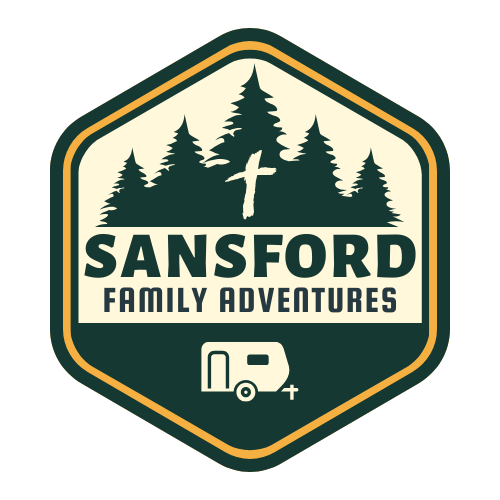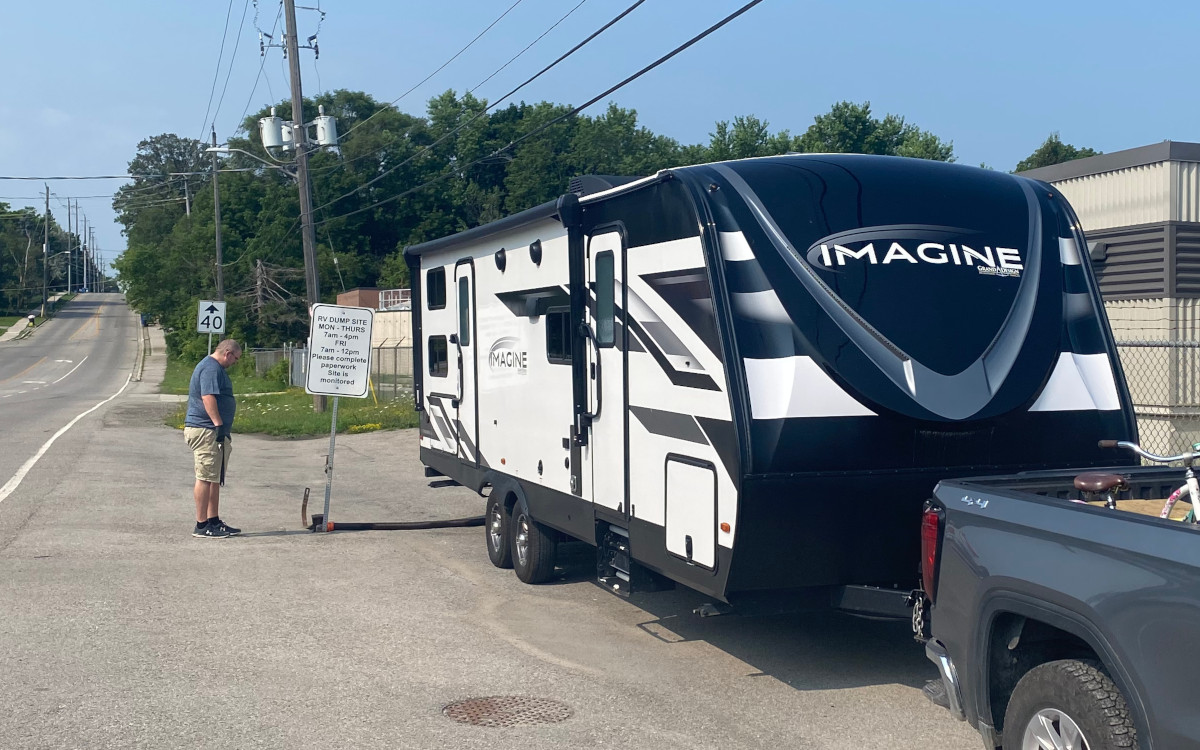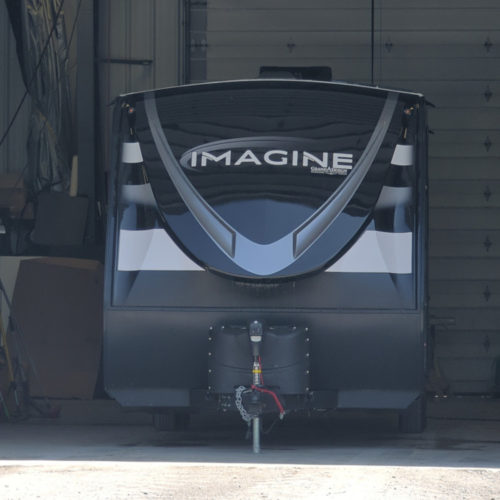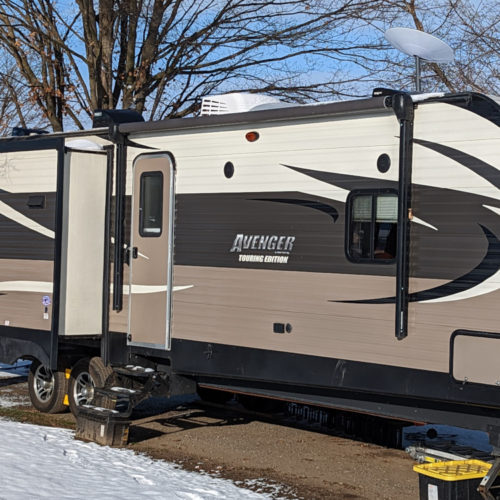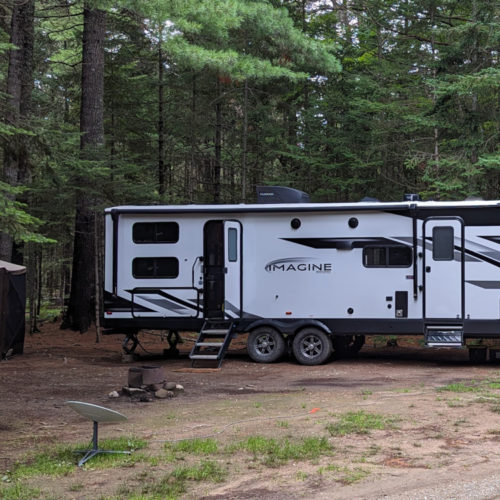I remember our first RV purchase. It was an exciting time for the whole family, especially the kids. If I’m honest, it was also overwhelming. Don’t worry. With a bit of research and careful planning, you’ll be a safe and seasoned RVer in no time.
The first thing you need to know is there is plenty of help available to make sure your first adventure isn’t your last. There are a few essentials you are going to need to hook up your camper. You’ll want to make sure your tow vehicle is properly equipped and you’ve familiarized yourself with basic towing procedures. Also, make sure you understand basic campground etiquette to make your first trip enjoyable.
Most dealerships should provide you with a thorough walk-through of your new unit. Don’t be afraid to ask questions. Some dealers will even offer an overnight stay at their lot (or a nearby campground) so you can get accustomed to your new RV with plenty of help nearby.
We had our first RV delivered right to a campsite and the driver helped set everything up and connect to the services. That was a big help. But trust me, after a couple of setups and breakdowns, you’ll have this process figured out.
There are a Few Things You’re Going to Need
If you purchased your camper from a dealer there’s a good chance it included a starter kit with a selection of accessories you’re going to need. The kit that came with our RV had almost everything for a basic three-service hook-up (power, water, and sewer). Make sure you have at least:
- a sewer hose
- a drinking water hose
- a water pressure regulator
- a 30-amp to 15-amp adapter plug (assuming you have a 30-amp trailer)
Our kit also included a few black tank treatment pods, disposable gloves, and a couple of rolls of RV-safe toilet paper (which we still haven’t used). These are nice-to-have items, but not an absolute need.
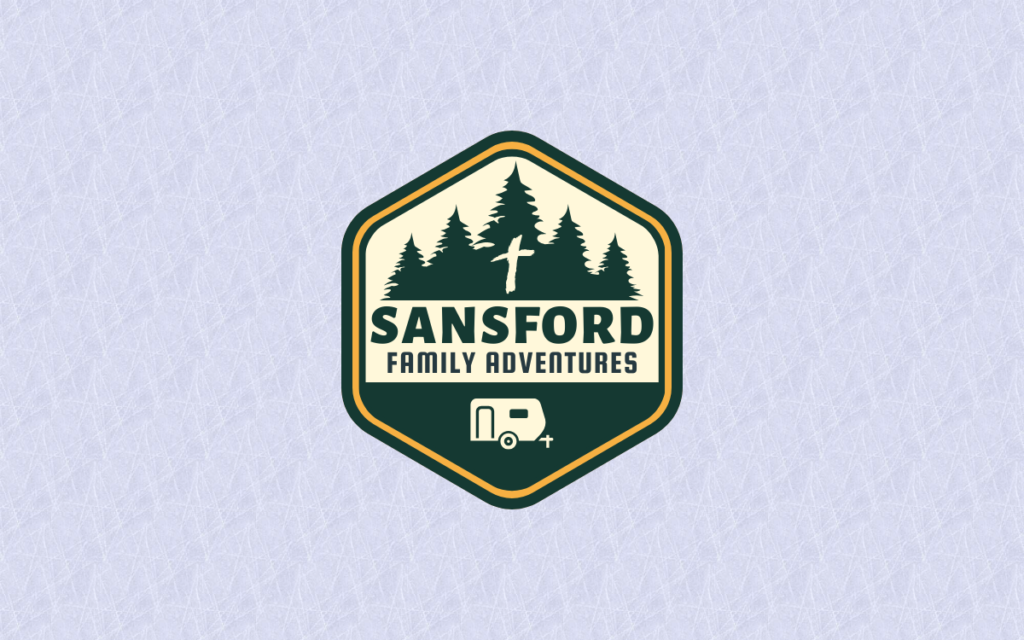
Another thing you’ll need is a good set of wheel chocks. We prefer the type that fits between the wheels (assuming a dual-axle trailer), but the standard wedge-shaped ones will also work. You may also want to grab a set of leveling blocks, especially if your camper has slideouts. It’s crucial to have the RV level before activating your slides.
A level camper also makes sleeping more comfortable. Seriously, have you ever tried sleeping in a bed that slopes to the side?
A level camper also makes sleeping more comfortable. Seriously, have you ever tried sleeping in a bed that slopes to the side? It’s not right. A level campsite is a tough thing to find. We use beveled 2x8s, but that’s because I had the lumber on hand and I was comfortable making them. The “Lego-style” stacking ones are a great option, and very popular.
Also, make sure you have the correct handle to lower the stabilizer jacks. Sometimes they go missing. Ask me how I know. Better yet, grab a cheap cordless drill with an adapter and a ¾” socket. It will change your life.
Be Extra Careful When Towing
Another big consideration for a first-time RV camper is towing. If you’re not used to towing a trailer with your vehicle, you’re in for an experience. Even if you have towed a trailer before, few people have towed something as big as a camper trailer. It’s a lot different than towing your utility trailer or even a boat. Unless it’s a really big boat.
Have your vehicle’s towing system fully inspected and set up to match your new camper at the dealership. If your RV is secondhand, or a rental, book an appointment with your local RV dealer for a similar inspection and setup. Once you’re properly connected, there are a few basics to keep in mind.
Have your vehicle’s towing system fully inspected and set up to match your new camper at the dealership.
You’re carrying a lot more weight. Most campers weigh as much or more than your tow vehicle. While there are no safety issues with that, common sense is the name of the game here. You’ll need to remember four key things:
- You’re going to need more time to stop. Your trailer has its own brakes, but give yourself some extra space. Brake early and gently. If you’re the type that slams on the brakes 100 feet from the stop sign, you’ll want to rethink your approach. That won’t work with a big camper in tow.
- You’ll need to make wider turns. While you don’t need to swing as wide as a tractor-trailer, you need to give yourself extra room to make the turn. Keep an eye on the trailer wheels in your side rear-view mirrors to get a sense of how much tighter your trailer turns. It will surprise you.
- Slow down. View the speed limit as just that, the speed limit. I know we like to add on a few extra digits, but that’s before you doubled the weight of your vehicle. Stay below the number on the sign. Not only is it safer, but your fuel mileage will thank you.
- Pay attention to your fuel gauge and mileage. Towing an RV will have a huge impact on your efficiency. With our half-ton and 32-foot trailer, our fuel mileage drops by 50% when towing. That means while we’re used to getting 700 kilometers on a full tank, we only get 350 when pulling the camper. You’ll need to stop for fuel more often. Make sure your next fuel stop is in range.

Pro tip: empty parking lots are your friend. Pull in and practice maneuvering and backing up your RV. Pick out a spot and pretend it’s your campsite. Practice backing in and pulling out a few times. Trust me, it’ll be a big help to have a few rounds under your belt before you arrive at your first campground.
Understand Basic Campground Etiquette
Campgrounds are interesting places. They can also be very intimidating. They’re often busy. Some are quite crowded and can make maneuvering a challenge, especially for a first-time RV camper. It’s going to feel like everyone is staring at you and judging your every move. Some are, but the vast majority are watching to see if you need any help.
Do not be afraid to ask for help from your neighbors. RVers are the nicest, friendliest people you’ll ever meet. They’re quick to lend a hand. Remember, they all had a first RV experience too, even though a few of them have forgotten that fact. I’ve had plenty of experience towing and backing up trailers, but was very glad for the offer of help from a fellow camper at a campground in Quebec. It was a tight spot, but the extra set of eyes made it easier.

I’d also recommend you arrive at your campground with plenty of daylight left. Even an experienced RVer will have a challenge backing into a spot in low light. If backing up is more than you are comfortable with, then reserve a pull-through spot. Many campgrounds offer these sites, but often they are premium sites and may cost more. Let the office staff know you’re new to RVing when you check in and ask if they have a site that might be easier to access for a first-timer.
Treat their property as you would have someone treat yours.
Pay close attention to the campground rules. Many have strict policies about pets, noise, and campfires. Normally, I’m an ask-for-forgiveness later type of person, but not when it comes to camping on someone else’s property. Always ask first. If you’re unsure about something, ask. Treat their property as you would have someone treat yours. Don’t drive on the grass. Clean up after your pet. Don’t leave garbage outside. You get the idea.
There are a lot of variables to keep track of when you’re RVing. Get yourself a good checklist and follow it every time. It will become second nature to you after a few trips. Most importantly, relax and have fun. An RV adventure is a fantastic way to spend a vacation or enjoy a full-time lifestyle. Sure, it’s intimidating at first, but apply common sense, ask for help with things you don’t understand, and most of all, be a good neighbor. The rest of the small stuff will be easy.
